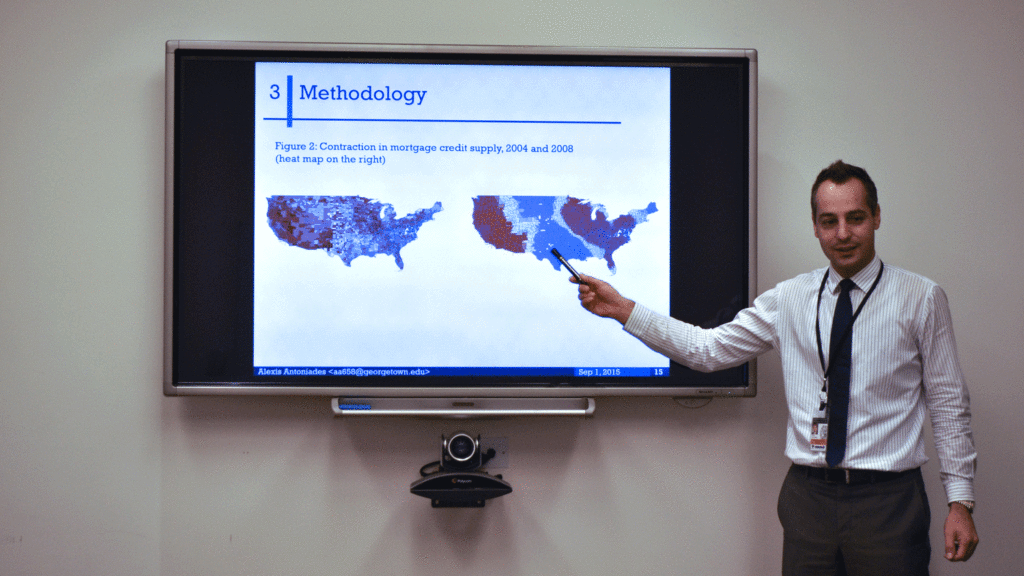Georgetown Scholar Sheds New Light on Winning American Presidential Elections

The influence of the economy on American voting behavior was the focus of a recent Georgetown University in Qatar (GU-Q) Faculty Research Colloquium which featured GU-Q professor Alexis Antoniades in a high-level discussion of original research titled: Mortgage Market Credit Conditions and U.S. Presidential Elections.
The GU-Q Faculty Research Colloquium is regular forum where colleagues from GU-Q and other universities in Doha, the region and around the world present and discuss current research. Working with research partner, Dr. Charles W. Calomiris from the Columbia Business School, Dr. Antoniades found the first hard evidence of a relationship between changes in home loan credit supply and voting behavior, which he presented at the colloquium. “Our work is the first empirical study confirming that voters in U.S. presidential elections actually punish politicians for declines in the supply of mortgage credit by not voting for them in elections. These results have important implications for research and policy,” he said.
Prior to this research, there was no data to back up the generally accepted theory that a bad economy hurts the reelection chances of a sitting president. “Economic voter hypothesis is a key issue in political science. As scholars, we want to know what part of a bad economy drives these results. Is it unemployment? Inflation? Or is it high prices?” he asked. “There was no research that answered these questions before.”
By reviewing the campaigns of politicians all the over the world, the research showed a pattern. “Whether in Brazil or the U.S. or the UK, all of the politicians we studied emphasized access to credit in their campaigns for reelection, and how they want to help their constituencies have access to loans. This evidence suggests that politicians behave as if they believe voters will reward them for delivering cheap credit. So we tested that theory.”
These programs, also referred to as “election year opportunism”, led the researchers to study 2004 and 2008 U.S. presidential elections’ voting data, and to look for links to available credit supplies for home buying loans. The researchers concluded that in terms of lost votes, the decrease in mortgage credit supply from 2004-2008 was five times as important as the increase in unemployment rate in influencing voter choices at the voting booth. “We also determined that voters do not seem to reward politicians with more votes if they increase the amount of credit,” he clarified. His research offers a new mechanism to study the economy: changes in the supply of credit.
Dr. Alexis Antoniades is an Associate Professor of Economics at GU-Q where he teaches International Finance, Sport Economics, and various topics in International Economics.
A Fulbright scholar, his current research project builds on work he did as a visiting fellow to Princeton University in the 2012-2013 academic year.
The Faculty Research Colloquium meets every week or two during the spring and fall semesters with the central goal of furthering GU-Q faculty’s research by providing a platform both to present their ideas and to learn from other’s ideas. More information as well as a full calendar of future presentations can be found at https://qatar.sfs.georgetown.edu/frc.